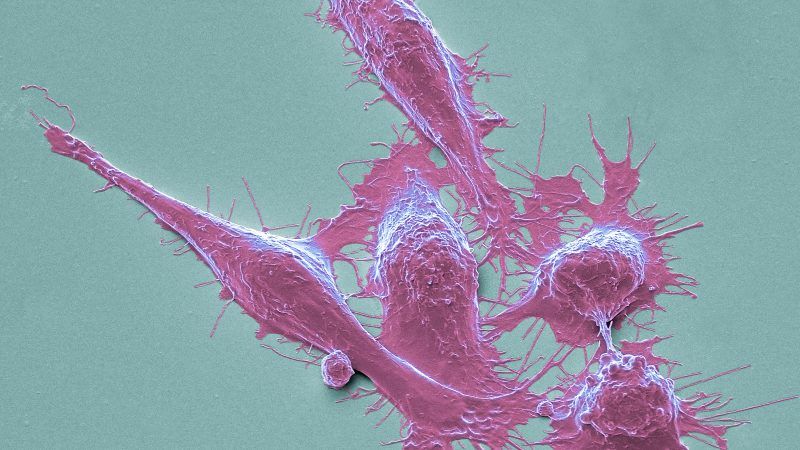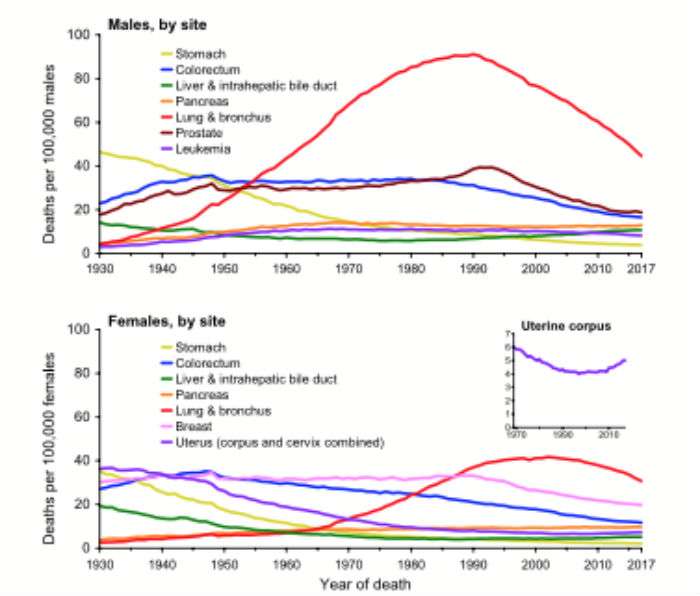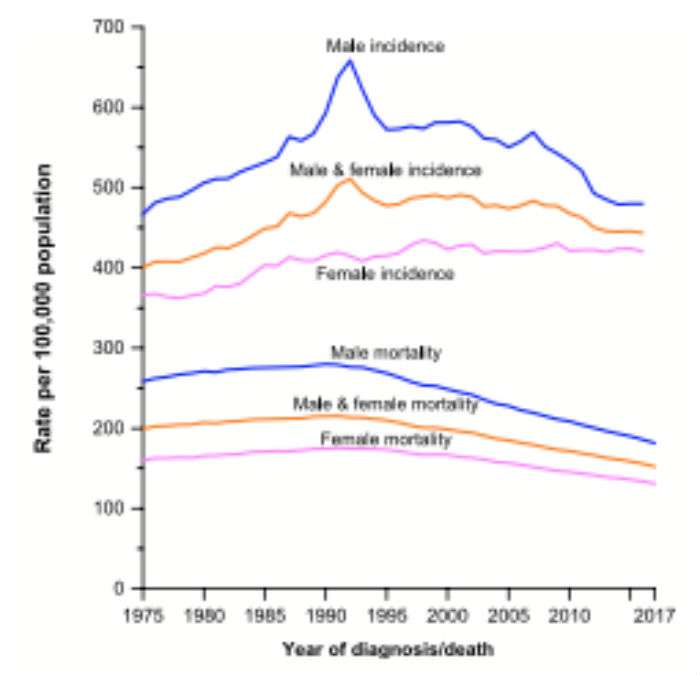The Largest Single-Year Drop in U.S. Cancer Death Rate Ever Recorded
No rising cancer epidemic, reports the American Cancer Society.

From 2016 to 2017—the most recent period for which we have complete statistics—America's death rate for cancer saw "the largest single-year drop ever recorded." So says the American Cancer Society's Cancer Facts & Figures 2020 report, which notes that the 2.2 percent drop that year was part of a larger 29 percent decline since 1991. Back then, there were 215 cancer deaths for every 100,000 people; by 2017, the figure had fallen to 152 per 100,000.
An accompanying article in CA: A Cancer Journal for Clinicians notes that this translates into an "estimated 2.9 million fewer cancer deaths than would have occurred if peak rates had persisted." The report adds that "the 5-year relative survival rate for all cancers combined has increased substantially since the early 1960s, from 39% to 70% among whites and from 27% to 64% among blacks."
For nearly three decades, the death rates for the four most common cancer types—lung, colorectal, breast, and prostate—have dropped substantially. This follows from a steep decline in smoking tobacco as well as increased early screening and improved therapies:

What about incidence rates? They too have fallen substantially from their peaks in the 1990s, but they have flattened out in recent years:

Why the flattening? The American Cancer Society suggests this is, in part, because of an increase in malignancies associated with rising rates of obesity, including uterine, esophageal, breast, thyroid and pancreatic cancers. "Almost 1 in 5 cancers is caused by excess body fat, alcohol consumption, poor nutrition, and a sedentary lifestyle," notes the Cancer Facts & Figures 2020 report. By comparison, smoking tobacco is associated with nearly 30 percent of cancer deaths.
So there's more to be done. But overall, this is good news: There is no rising cancer epidemic in the United States, and we're getting a lot better at treating the cases that do occur.
Editor's Note: As of February 29, 2024, commenting privileges on reason.com posts are limited to Reason Plus subscribers. Past commenters are grandfathered in for a temporary period. Subscribe here to preserve your ability to comment. Your Reason Plus subscription also gives you an ad-free version of reason.com, along with full access to the digital edition and archives of Reason magazine. We request that comments be civil and on-topic. We do not moderate or assume any responsibility for comments, which are owned by the readers who post them. Comments do not represent the views of reason.com or Reason Foundation. We reserve the right to delete any comment and ban commenters for any reason at any time. Comments may only be edited within 5 minutes of posting. Report abuses.
Please to post comments


Data presented without margins of error is worse than useless. The long-term trends are statistically significant. This headline about "the largest single year drop"? Not so much.
The good news; cancer rates fell dramatically from 2016-2017. The bad news; the most effective treatment for reducing people's risk of developing cancer was opioids.
The good news; cancer rates fell dramatically from 2016-2017. The bad news; the most effective treatment for reducing people’s risk of developing cancer was
opioidsflavored vaping.And alcohol and suicide. Fewer old white guys living long enough to die from cancer.
Cancer rates fell from 2016-2017 - yes. Or at least, it's highly probable that they fell.
"fell dramatically" - unproven. Neither this article nor the source study clearly report the error margins of their statistics. If the drop was -2.2% +/- 0.1%, I'd agree that's dramatic and there's reason to think we're doing something different. If the drop was -2.2% +/- 1%, it's indistinguishable from the prior trend and your guesses about causation are potentially not just wrong but dangerously misleading.
Thanks for the good news, Mr. Bailey!
“chemjeff radical individualist
January.7.2020 at 6:07 pm
When your response consists of an insult, I know I’ve hit the mark”
So you’re saying I’m the most correct person on this board for over a decade?
You’ve spent three days running from the question
The data isn't very useful unless we know the political affiliation and beliefs of the patients. I can gaurentee that being a clingers causes cancer. They are all terrible eating smokers, the only thing that counteracts their terrible habits is their alt-right marches (the center of Chicago to Skokie is about a 15 mile March)
They are all terrible eating smokers
If I ate my smoker, I wouldn't have anything to cook the brisket!
Just don't eat Kirkland; he's toxic.
How can we turn this good news into a political cudgel though???
Maybe the cancer deaths were stopped because of abortion? Or by a good guy with a gun?
abortionist with a gun
(which incidentally is the name of my industrial band)
Trump threw everyone off Obamacare; and they all died two years ago?
No, Obamcare is working better than anyone expected, which is why we need to #resist Trump.
Trump is the cancer on America now...
But, but, CHEMICALS !!!
Here’s some rain for the parade:
https://www.npr.org/2020/01/08/794772148/alcohol-related-deaths-have-doubled-study-says
Of course more people drinking themselves to death should lower cancer deaths even more
Of course, excessive drinking also increases cancer risk, so it's a race.
Not just rates falling but better tools for detection and treatment.
Here is one example. Computer aided detection of pulmonary nodules on CT scans. They result in higher detection rates and are in use now.
https://www.diagnosticimaging.com/news/effect-cad-lung-cancer-screening
Sign of climate change?